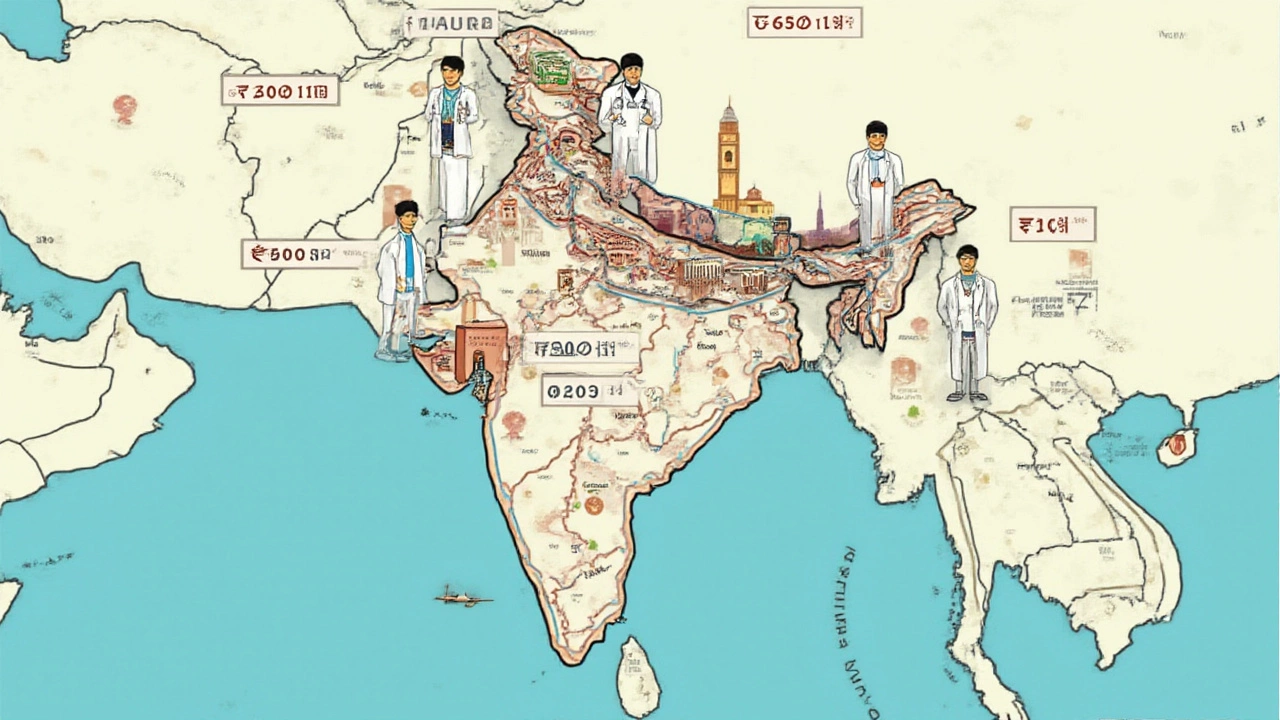MBBS Doctor Salary in India: Latest Insights and Career Earnings
 Jul, 12 2025
Jul, 12 2025
You might think that becoming a doctor in India is a golden ticket – prestige, security, and, of course, a hefty paycheck. But is that really the truth behind the numbers? Let’s pull the curtain back on the salary of an MBBS doctor in India and see what’s actually waiting for young doctors when they step out of college, stethoscope in hand. You’ll find stories of both extreme struggle and outright success, plus a few things most brochures or coaching centers skip over. If you’re planning medical school or just curious, there’s more to the salary conversation than meets the eye.
How Much Does an MBBS Doctor Really Earn?
Ask ten doctors in India how much they make, and you could get ten wildly different answers. The wide gap in salaries isn’t just about experience – it depends on city, sector, qualifications, and even timing. The big picture? A fresh MBBS graduate, with zero specialization, usually lands a starting monthly salary between ₹30,000 and ₹60,000 if they join a government hospital. In private hospitals, the range is wider: ₹25,000 to ₹80,000 per month, sometimes more in high-demand cities or premium hospitals.
Some fresh graduates even take up internships, where stipends can be less glamorous. For example, government-mandated internship stipends were around ₹17,000 to ₹23,500 per month in 2024 for most central and state-run medical colleges. Let’s break it into some cold, hard numbers – here’s a snapshot:
| Hospital Type | Entry Level (₹/month) | Average (₹/month) | Senior (₹/month) |
|---|---|---|---|
| Government (Fresh MBBS) | 30,000 | 45,000 | 1,00,000+ |
| Private (Fresh MBBS) | 25,000 | 40,000 | 1,50,000+ |
| Rural Clinics/Dispensaries | 20,000 | 30,000 | 60,000 |
But don’t forget, these numbers can shift based on location. In big metros like Mumbai, Delhi, or Bangalore, salaries might be on the higher side for private sector jobs, simply because of cost of living and patient volume. However, in tier-2 or tier-3 cities, private hospitals might offer less, balancing it with lower expenses. Government scales are more stable but take longer to climb. The big jump happens post specialisation (MD/MS/DM), but that’s a story for another day. Still, many are surprised to find that initial salaries can feel lower than the hype, especially given the years of tough medical training and intense competition.
For those thinking about money as the major carrot, here’s the kicker – most MBBS doctors get their real financial break after post-graduation. That’s when salaries can leap from a modest ₹50,000 straight to ₹1.5-4 lakh or more per month, depending on the specialization and the hospital. And yes, a lot of doctors push through the grind because of this very payoff at the end of the tunnel.
What Decides a Doctor’s Salary in India?
The answer isn’t just about the letters after your name. Let’s dig deeper. First, government vs private jobs: the government sector offers security, fixed working hours, structured pay grades, and perks like pensions, but increments are slower. Private hospitals can pay high-flyers more, especially if you have experience or special skills, but job security is always a bit shaky and long working hours are normal. Then there’s the matter of city. Doctors working in New Delhi’s top hospitals or Mumbai’s plush chains will naturally have a higher earning potential than someone working in a small-town hospital. Why? More patients, higher consultation fees, and wealthier clients can drive up income for both salaried and self-employed doctors.
Let’s talk specialisation. An MBBS is just the baseline; only a handful of doctors stop at this level. Many go on to pursue MD/MS, and that’s where the real magic happens for your bank account. Specialised skills bring in much bigger salaries, sometimes double or triple the base MBBS pay. For example, a cardiologist, gastroenterologist, or radiologist can easily make over ₹2 lakh per month at a reputable private hospital, and top consultants in metros may rake in ₹6 lakh or more with years of experience and an established reputation.
Another huge factor: government schemes and contractual posts. Initiatives like the National Health Mission (NHM) often create contract doctor posts, basically short-term jobs for MBBS graduates. These can pay ₹50,000 to ₹1 lakh per month, depending on location and urgency. The catch? Short contract length and lack of long-term benefits.
- Hospital Brand: Working for AIIMS or Apollo Hospitals doesn’t just look good, it pays better, with higher pay slabs or additional perks.
- Side Gigs: Lots of MBBS doctors take up locum work (filling in at other hospitals), telemedicine, or even opening a small private OPD to supplement earnings. Some use online platforms, offering video consultations, which can add ₹20,000-₹50,000 per month or more.
- Experience: If you keep climbing, seniority pays off. Doctors with over 10-15 years of experience can expect to move into leadership roles or top consultant status, especially if they stay put in one institution.
- Location Bonuses: Some rural areas or underserved states offer extra incentives to lure young doctors—think signing bonuses or a monthly premium, sometimes ₹10,000-₹20,000 more than average pay.
Last, let’s not forget private practice – the old school route. It’s a gamble, with no fixed salary, but the sky’s the limit if you build a name, open your own clinic, or join a profitable group practice. Of course, it takes patience, lots of ground work, and sometimes a dose of good luck.

State-Wise Salary Differences: Does Where You Work Matter?
Location is everything. A doctor working in metropolitan Chennai could see a pay packet nearly double what a colleague in a small Odisha town might earn. Every Indian state has its own pay scale policies for government doctors, and private sector rates mirror the local economy and demand for healthcare. Here’s the thing – states like Karnataka, Maharashtra, Tamil Nadu, and Kerala often offer the best starting government salaries for MBBS doctors, sometimes up to ₹60,000-₹80,000 a month with allowances. Why? These states have robust health budgets, better infrastructure, and more competitive hiring. In contrast, some North-Eastern states, rural UP, Bihar, or MP, while in desperate need of doctors, often have lower salary slabs but may lure talent with housing, quick promotions, or rural posting bonuses.
Let’s look at some real numbers drawn from 2024-2025 available recruitment advertisements:
| State | Govt. MBBS Salary (Starting) | Allowances/Bonuses |
|---|---|---|
| Maharashtra | ₹70,000 | Up to ₹15,000 city, house rent |
| Karnataka | ₹68,000 | Up to ₹12,000 city, rural |
| Tamil Nadu | ₹62,000 | Up to ₹8,000 HRA |
| Kerala | ₹63,000 | Travel and shift |
| Bihar | ₹45,000 | Rural bonus up to ₹8,000 |
| Uttar Pradesh | ₹47,000 | Rural areas bonus |
| West Bengal | ₹52,000 | – |
Private sector numbers? They’re all over the map, ranging from low five figures in smaller towns to six-figures in plush city hospitals. Then there’s city cost. Mumbai or Delhi, for all their higher salaries, take a chunk out of your take-home with crazy housing costs. Compare that to a city like Thiruvananthapuram or Chandigarh, where your salary stretches much further even if the basic pay is a bit less. Some city governments, like Delhi, toss in extra hardship allowances or travel subsidies for government doctors posted in high-pressure areas. In private hospitals, your bargaining power comes down to the hospital’s business and your ability to negotiate. Don’t be surprised if brand-new MBBS doctors take home less than a well-established family physician in a small Punjab town!
One quirky fact: certain rural districts run special doctor recruitment drives with ‘risk’ incentives for posting in hard-to-reach areas. For MBBS docs willing to take up posting in tribal belts or border areas, a monthly add-on of ₹15,000-₹25,000 is sometimes available. But there’s a flipside: burnout is high, and frequent transfers or short contracts are common, so read the fine print.
Tips, Insights, and Real Career Advice
If you’re chasing money as an MBBS doctor in India, think of it more as a marathon, not a sprint. The early years can be modest, especially if you’re paying off education loans, dealing with expensive relocations, or supporting family. Here’s what most textbooks and counselors don’t mention: build your career one smart move at a time. Interested in government jobs for stability? Prepare hard for competitive exams like UPSC CMS or state PSCs, which can unlock higher pay scales and permanent benefits early on. Thinking about moving up quickly? Network with alumni, professors, or industry mentors – referrals matter more than you think, especially in big private hospital chains.
- Consider adding skills. Short courses in radiology, critical care, or medical coding can bring in side income and give you an edge during job interviews.
- Keep an eye on evolving healthcare trends. Telemedicine is booming; even a few hours a week can boost your monthly take-home by thousands.
- If you have the appetite, explore government contract jobs in underserved areas for a few years. The incentives and experiences can set you apart, and some states provide reservation for government contract doctors when hiring for permanent posts later.
- Don’t ignore work-life balance. Chasing the highest salary can take a toll on health, especially in private hospital jobs demanding long shifts. Sometimes a slightly lower salary with stable hours and better team culture is the smarter pick.
- Be patient about postgraduate seats. Yes, your real financial leap is post-specialization, so plan for NEET PG or DNB. But don’t miss job opportunities in the meantime – experience always helps, even during PG entrance interviews.
- Money isn’t everything. Sure, a chunky private paycheck sounds tempting, but job satisfaction and growth matter. Many doctors eventually open their own practice or move abroad for advanced training. Each path has its own pros and cons.
Here’s one tip if you’re just getting started: try working in varied environments early in your career. A year in a busy metro hospital, followed by rural contract work, and then a stint with a startup as a telehealth consultant can totally change your outlook – and boost your future bargaining skills. Also, track government job notifications and keep certifications updated. Hospitals love ready-to-join candidates who know how to handle both patients and paperwork.
There’s no ‘one salary’ for an MBBS doctor in India. The journey is as unique as each doctor’s ambitions and grit. Working hard might get you in the door, but working smart will keep you ahead. What’s certain—medicine isn’t just a job, it’s a calling. The mbbs doctor salary might be the headline, but the real story is how you build a career and life around it in one of the world’s most demanding, yet rewarding, professions.